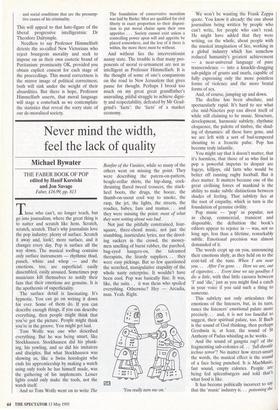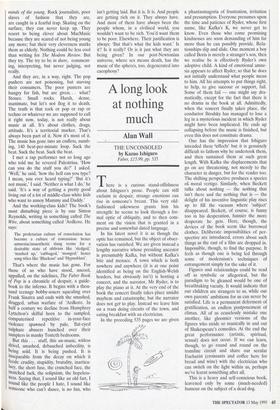Never mind the width, feel the lack of quality
Michael Bywater
THE FABER BOOK OF POP edited by Hanif Kureishi and Jon Savage Faber, i16.99, pp. 813 Those who can't, no longer teach, but go into journalism, where the great thing is to natter and scratch like hens. Scratch, scratch, scratch. That's why journalists love the pop industry: plenty of surface. Scratch it away and, look!, more surface, and it changes every day. Pop is surface all the way down. The musical toolbag contains only surface instruments — rhythmic thud, punch, whine and whop — and the emotions, too, are superficial: easily dissembled, easily aroused. Sometimes pop musicians kill themselves to notify their fans that their emotions are genuine. It is the apotheosis of superficiality.
The surface detail is fascinating. It's hypnotic. You can go on writing it down for ever. Some of them do. If you can describe enough things, if you can describe everything, then people might think that you've got the picture. People might think you're in the groove. You might get laid.
Tom Wolfe was one who described everything. But he was being smart, like Stockhausen. Stockhausen did his plunk- ing, his yowling, and so did his imitators and disciples. But what Stockhausen was showing us, like a Swiss horologist who ends his apprenticeship by making a watch using only tools he has himself made, was the gathering of his implements. Lesser lights could only make the tools, not the watch itself.
And so Tom Wolfe went on to write The Bonfire of the Vanities, while so many of the others went on missing the point. They were describing the patern-on-pattern, beagle-collar shirts, the hip-slung, cock- thrusting flared tweed trousers, the stack- heel boots, the drugs, the booze, the thumb-on-snout cool way to smoke, the rasp, the jet, the lights, the streets, the roadies, babes, fans and mamas. . . and they were missing the point: most of what they were writing about was bad.
Not just the pitifully constrained, four- square, three-chord music, not just the stumbling, inarticulate lyrics, nor the drool- ing suckers in the crowd, the money- men smelling of burnt rubber, the parched, bug-eyed hangers-on, the talcumed therapists, the lizardy suppliers. . . they were easy pickings. But so few questioned the scorched, manipulative stupidity of the whole nasty enterprise. It wouldn't have been cool. Pop was basically fine. It was, like, the suits. . . it was them who spoiled everything. Otherwise? Hey — Arcadia, man. Yeah. Right.
`You really turn me on.' We won't be wanting the Frank Zappa quote. You know it already: the one about journalism being written by people who can't write, for people who can't read. He might have added that they were writing, on the whole, about people with the musical imagination of lice, working in a global industry which has somehow reduced humanity's greatest achievement — a near-universal language of pure transcendence — into a knuckle-dragging sub-pidgin of grunts and snarls, capable of fully expressing only the more pointless forms of violence and the more brutal forms of sex.
And, of course, jumping up and down.
The decline has been absolute, and spectacularly rapid. It's hard to see what else mid-Nineties pop can divest itself of while still claiming to be music. Structure, development, harmonic subtlety, rhythmic eloquence, the palette of timbre, the shad- ing of dynamics: all these have gone, and we are left with a sort of bad-tempered shouting to a frenetic pulse. Pop has become truly infantile.
You might say that it doesn't matter, that it's harmless, that those of us who find in pop a powerful impetus to despair are fogeys, killjoys, old farts who would be better off running rugby football. But it does matter. It matters because one of the great civilising forces of mankind is the ability to make subtle distinctions between shades of feeling. That subtlety lies at the root of empathy, which in turn is the foundation of genuine civility.
Pop music — 'pop' as popular, not as cheap, commercial, transient and disposable, the definition the book's editors appear to rejoice in — was, not so long ago, less than a lifetime, remarkably subtle. Emotional precision was almost demanded of it.
The words crept up on you, announcing their emotions shyly, as they held on to the coat-tail of the tune. When I am near you. . . After I'm gone. . . Here we are, out of cigarettes. . . Every time we say goodbye I die a little, with that little caesura between `I' and 'die,' just as you might find a catch in your voice if you said such a thing to someone.
This subtlety not only articulates the emotions of the listeners, but, in its turn, tunes the listeners' emotional palate more precisely. . . and, it is not too fanciful to suggest, their spiritual palate, too. If Bach is the sound of God thinking, then perhaps Gershwin is, at least, the sound of St Anthony of Padua whistling as he works.
And the sound of gangsta rap? of the fragmenting sub-colonies of. . . full-throttle techno terror'? No matter how street-smart the words, the musical effect is the sound of a face being punched. It is MacMusic, fast sound, empty calories. People are being fed spleenburgers and told that's what food is like.
It has become politically incorrect to say that the 'music' industry is. . . poisoning the minds of the young. Rock journalists, poor slaves of fashion that they are, are caught in a fearful trap. Skating on the surface, they can never keep up. They resort to being clever about MacMusic because they are scared of not being young any more; but their very cleverness marks them as elderly. Nothing could be less cool than writing for The Modern Review. But they try. The try to be in there, comment- ing, interpreting, but never judging, not really.
And they are, in a way, right. The pop pushers are not poisoning, but starving their consumers. The poor punters are hungry for fish, but are given. . . what? Stones. Small rocks. Harsh, dense, inanimate, but let's not flog it to death. The truth is that rock or pop or rap or techno or whatever we are supposed to call it right now, today, is not really about music at all. It's about clothes, drugs, attitude. It's a territorial marker. That's always been part of it. Now it's most of it. The music has gone into an endless, numb- ing, 140 beat-per-minute loop. Suck the beat. Suck the beat. Suck the beat.
I met a rap performer not so long ago who told me he revered Palestrina. 'How can you do the stuff you do?' I asked. 'Well,' he said, 'how the hell can you type? I mean, you ever heard typing?' But it's not music,' I said. 'Neither is what I do,' he said. 'It's a way of getting a pretty good living out of a lot of middle-class white kids who want to annoy Mummy and Daddy.'
And the working-class kids? The book's most disturbing piece is by one Simon Reynolds, writing in something called The Wire, about something called 'Ardkore. He says:
The proletarian culture of consolation has become a culture of concussion: hence amnesiac/anaesthetic slang terms for a desirable state of oblivion like `sledged,' `mashed up,' cabbaged,"monged;' hence song titles like 'Blackout' and 'Hypnoblast'.
That's where the music has gone. For those of us who have stood, uncool, appalled, on the sidelines, The Faber Book of Pop is a chronicle of despair, a guide- book to the inferno. It begins with a thou- sand teenage bobby-soxers squealing over Frank Sinatra and ends with the smashed, drugged, urban warfare of 'Ardkore. In half a century we decline from Humphrey Lyttelton's skilful horn to the sampled, Computerised repetitive in-your-face violence spawned by pale, flat-eyed sulphate abusers hunched over their samplers in manky Toxteth bedrooms.
But this . . . stuff, this un-music, witless drivel, smashed, debauched imbecility, is being sold. It is being pushed. It is inseparable from the decay on which it feeds: crudity, stupidity, brutality, inarticu- lacy, the short fuse, the crunched face, the snatched fuck, the solipsism, the hopeless- ness. Saying that, I sound like an old fart, I Sound like the people I hate, I sound like someone who can't dance, is no fun, who isn't getting laid. But it is. It is. And people are getting rich on it. They always have. And most of them have always been the people whom, in a civilised world, you wouldn't want to be rich. You'd want them to be poor. Elsewhere. Their justification is always: 'But that's what the kids want.' Is it? Is it really? Or is it just what they are being given? In our post-Newtonian universe, where sex means death, has the music of the spheres, too, degenerated into cacophony?



































































 Previous page
Previous page